

Morals, Not Memories, Define Who We Are. Have you ever wondered just what it is that makes you, you?
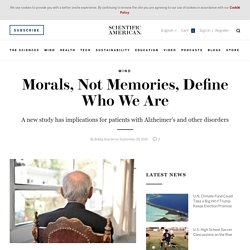
If all your memories were to fade away, would your identity dissolve along with them? Would friends and family no longer perceive you to be the same person as before? For the 5.3 million Americans experiencing memory loss due to Alzheimer’s disease, these frightening questions are more than just theoretical. European Union helps match refugees with science jobs. Since the beginning of the year, more than 500,000 refugees fleeing civil war and unrest in the Middle East and elsewhere have sought safety in the European Union.
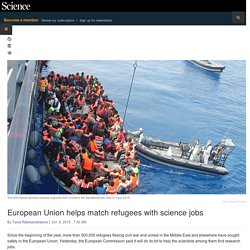
Yesterday, the European Commission said it will do its bit to help the scientists among them find research jobs. Under a program called Science4Refugees, launched today by E.U. research commissioner Carlos Moedas, the commission says it will help match refugees with universities willing to hire them. Refugees and asylum-seekers with a science background can upload their resume on a dedicated page on Euraxess, the E.U. research careers website.
Meanwhile, universities willing to help can get a badge from the commission as “refugee-welcoming organizations” and advertise jobs, internships, or training programs as refugee-friendly. Rebuilding their lives and careers can be difficult for refugees, a Syrian computer scientist recently told Science Careers in a Q&A. Feature: A controversial company offers a new way to make a baby. Expert dreamers. Where did the ‘gay lisp’ stereotype come from? JACKSONVILLE, FLORIDA—The notion of a “gay lisp”—an offensive stereotype to many people—has been a confusing phenomenon for linguists.
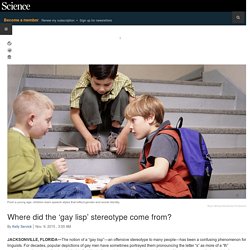
For decades, popular depictions of gay men have sometimes portrayed them pronouncing the letter “s” as more of a “th” sound—even though studies have failed to find “lispier” speech in gay men than in straight men. Now, however, preliminary data from a small study presented here last week at the biannual Meeting of the Acoustical Society of America (ASA) show that young boys who don’t identify with their assigned gender use “th”-like pronunciation at slightly higher rates than their peers who do, although they seem to grow out of that tendency.
The authors speculate that stereotypes of gay adults may be rooted in the speech of boys who go on to identify as gay. Munson wanted to explore how the crisp “s” speech style might emerge in young men. European Commission appoints top scientists to fill policy advice gap. BRUSSELS—Seven scientists, including a Fields medalist and the director of CERN, Europe's premier particle physics lab, have been appointed today to provide the European Commission with policy advice—bringing an end to a year of suspense since the awkward exit of Anne Glover, the first and only chief scientific adviser (CSA) in the commission's history.
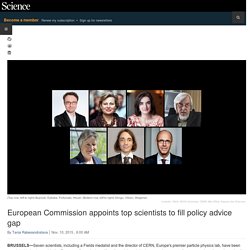
The high-level group is part of a larger setup, called the Scientific Advice Mechanism (SAM), that replaces the controversial single-headed adviser role—which ended just 3 years after the previous administration created it. The new group includes four men and three women from seven different countries and seven disciplines. They will not be employed by the commission and will keep their current jobs. They are: ∙ Polish bioinformatician Janusz Bujnicki, who leads a lab at the International Institute of Molecular and Cell Biology in Warsaw and serves on a scientific policy committee that advises Poland's science ministry; Publications » DICE. Most of our academic publications registered in HAL are listed below.
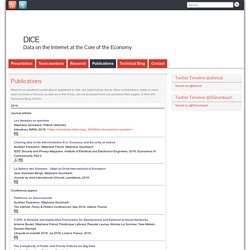
Some other contributions, made in more open journals or forums, as well as in the Press, can be accessed from our personal Web pages, or from the Technical Blog of Dice. Journal articles. Five Leads for Self-Help with WordPress.com ‹ Reader — WordPress.com. The Coming Technology of Out-of-Body Experiences.
The Alone ‹ Reader — WordPress.com. BLDGBLOG. Stanford Social Innovation Review. A whole continent may one day attribute the end of one of the most violent rites enacted on young African women’s bodies to a white lady from Illinois.
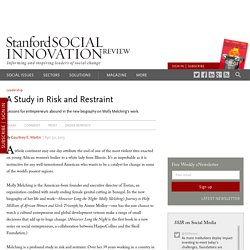
It’s as improbable as it is instructive for any well-intentioned American who wants to be a catalyst for change in some of the world’s poorest regions. Molly Melching is the American-born founder and executive director of Tostan, an organization credited with nearly ending female genital cutting in Senegal. What Was Virtual Reality? : Longreads. If you visited a tech blog in the past two years, you will have undoubtedly noticed: no topic has been generating more buzz than non-real-reality (virtual, mixed, augmented—pick your flavor).
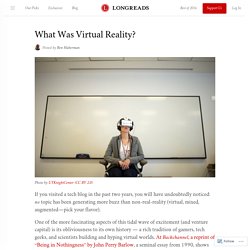
One of the more fascinating aspects of this tidal wave of excitement (and venture capital) is its obliviousness to its own history — a rich tradition of gamers, tech geeks, and scientists building and hyping virtual worlds. Contents of English Communication for Scientists. Scientific papers are for sharing your own original research work with other scientists or for reviewing the research conducted by others.
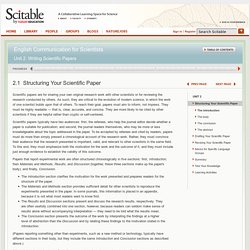
As such, they are critical to the evolution of modern science, in which the work of one scientist builds upon that of others. To reach their goal, papers must aim to inform, not impress. They must be highly readable — that is, clear, accurate, and concise. They are more likely to be cited by other scientists if they are helpful rather than cryptic or self-centered.
Scientific papers typically have two audiences: first, the referees, who help the journal editor decide whether a paper is suitable for publication; and second, the journal readers themselves, who may be more or less knowledgeable about the topic addressed in the paper. The Introduction section clarifies the motivation for the work presented and prepares readers for the structure of the paper. Q&A: How to encourage more scientific risk-taking—and efficiency. What should the prudent scientist focus on next?
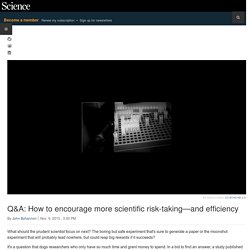
The boring but safe experiment that's sure to generate a paper or the moonshot experiment that will probably lead nowhere, but could reap big rewards if it succeeds? It's a question that dogs researchers who only have so much time and grant money to spend. In a bid to find an answer, a study published today in the Proceedings of the National Academy of Sciences takes a look at some hard numbers. And although the researchers don’t offer a sure-fire recipe for success, they do offer some food for thought. The study examines risk and reward in biomedical science. Most animal research studies may not avoid key biases. Researchers who conduct animal studies often don't use simple safeguards against biases that have become standard in human clinical trials—or at least they don't report doing so in their scientific papers, making it impossible for readers to ascertain the quality of the work, an analysis of more than 2500 journal articles shows.
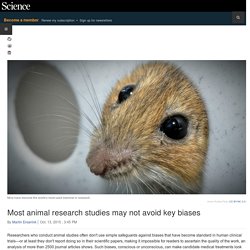
Such biases, conscious or unconscious, can make candidate medical treatments look better than they actually are, the authors of the analysis warn, and lead to eye-catching results that can't be replicated in larger or more rigorous animal studies—or in human trials. Neurologist Malcolm MacLeod of the Centre for Clinical Brain Sciences at the University of Edinburgh and his colleagues combed through papers reporting the efficacy of drugs in eight animal disease models and checked whether the authors reported four measures that are widely acknowledged to reduce the risk of bias. If you fail to reproduce another scientist’s results, this journal wants to know. The biotech company Amgen Inc. and prominent biochemist Bruce Alberts have created a new online journal that aims to lift the curtain on often hidden results in biomedicine: failed efforts to confirm other groups’ published papers.
Amgen is seeding the publication with reports on its own futile attempts to replicate three studies in diabetes and neurodegenerative disease and hopes other companies will follow suit. The contradictory results—along with successful confirmations—will be published by F1000Research, an open-access, online-only publisher. Its new “Preclinical Reproducibility and Robustness channel,” launched today, will allow both companies and academic scientists to share their replications so that others will be less likely to waste time following up on flawed findings, says Sasha Kamb, senior vice president for research at Amgen in Thousand Oaks, California. What will Obama’s last budget request mean for science? ScienceInsider was following the numbers today, as the White House rolled out its fiscal year 2017 budget request. Here are some dispatches from the front lines of the budget wars. NIH gambles on mandatory funding to keep afloat What at first glance looks like modest good news for National Institutes of Health (NIH) in the president’s budget—a $825 million increase—is instead drawing dismay and a lot of head scratching.
That’s because the administration wants to pay for the increase, as well as $1 billion of NIH’s existing budget, by using so-called mandatory funds that will likely be a hard sell in Congress. “We’re extremely concerned that NIH’s base budget is being cut,” says Jon Retzlaff, managing director of science policy and government affairs for the American Association for Cancer Research in Philadelphia, Pennsylvania. Top Nobel Prize administrator resigns in wake of Macchiarini scandal. The widening scandal surrounding surgeon Paolo Macchiarini and his employment at the Karolinska Insitute (KI) in Stockholm has prompted Urban Lendahl, secretary general of the Nobel Assembly, to resign.
Lendahl, a developmental geneticist at KI, was involved in hiring Macchiarini in 2010, according to Swedish media reports. A statement from the Nobel Committee today said that Lendahl expected to be involved in the investigation and was giving up his work on the committee “out of respect for the integrity of the Nobel Prize work.” KI announced last week that it had “lost confidence” in Macchiarini and would cut ties with him when his current contract as a senior researcher ends in November.
Researcher illegally shares millions of science papers free online to spread knowledge. A researcher in Russia has made more than 48 million journal articles - almost every single peer-reviewed paper every published - freely available online. And she's now refusing to shut the site down, despite a court injunction and a lawsuit from Elsevier, one of the world's biggest publishers. For those of you who aren't already using it, the site in question is Sci-Hub, and it's sort of like a Pirate Bay of the science world.
Responsible research guidelines for the global scientist. Yes, you're a great scientist; now shut up about it. Handful of Biologists Went Rogue and Published Directly to Internet. On Feb. 29, Carol Greider of Johns Hopkins University became the third Nobel Prize laureate biologist in a month to do something long considered taboo among biomedical researchers: She posted a report of her recent discoveries to a publicly accessible website, bioRxiv, before submitting it to a scholarly journal to review for “official’’ publication. How to (seriously) read a scientific paper. Adam Ruben’s tongue-in-cheek column about the common difficulties and frustrations of reading a scientific paper broadly resonated among Science Careers readers. Peer Reviewed Articles - Open Access Journals.
Science Magazine - 20 May 2016 - Page 928. <div><p>45. K. Robo-suit and virtual reality reverse some paralysis in people with spinal cord injuries. Doctoral Programme in Biomedicine and Biotechnology. Degree: Doctor of Medicine (MD), Doctor of Philosophy (PhD), Licentiate of Philosophy (PhL) Frontiers in Sociology. Public Mental Health welcomes submissions of the following article types: Book Review, Case Report, Clinical Study Protocol, Clinical Trial, Correction, Data Report, Editorial, General Commentary, Hypothesis & Theory, Methods, Mini Review, Opinion, Original Research, Perspective, Protocols, Review and Technology Report.
All manuscripts must be submitted directly to the section Public Mental Health, where they are peer-reviewed by the Associate and Review Editors of the specialty section. Articles published in the section Public Mental Health will benefit from the Frontiers impact and tiering system after online publication. Authors of published original research with the highest impact, as judged democratically by the readers, will be invited by the Chief Editor to write a Frontiers Focused Review - a tier-climbing article. Why rejection hurts so much — and what to do about it. Susan Cain: The power of introverts. Susan Cain on why it’s ok to eat alone. Susan Cain announces news to make introverts happy. Why We Are Attracted to Deviant Personalities. The Grumpy Introvert's Advice on Making Friends. Scenes from an Introverted Childhood. Read This If You’re In Your 20s And Have Never Been In A Serious Relationship.
8 traits of successful people - Richard St. John. Why it pays to work hard - Richard St. John. The power of passion - Richard St. John. The importance of focus - Richard St. John. How to Be Heard as an Introvert in the Workplace. Susan Cain Talks about Work and Leadership. The Hidden Advantages of Quiet Bosses. The Best Way to Lead? Intentionally Influence Others. What is love? - Brad Troeger. Inside OKCupid: The math of online dating - Christian Rudder. Tips. Make a powerful interview impact by controlling the intangibles. A Work Advice Q&A with Susan Cain. The Productivity Secret Behind Bill Gates's Incredible Success. 5 Things Smart People Know About Their Brains, According to a Neuroscientist. Why You Need to Be Nice to People. 7 Struggles People With Concealed Depression Understand.
How Smart People Deal With People They Don’t Like. 4 Ways to Deal With People Who Just Aren’t Very Nice. 4 Ways to Be a Good Friend During a Friend's Breakup. The Psychology of Why Some People Take Breakups Harder Than Others. Quiet: The Power of Introverts. Susan Cain: Don't Call Introverted Children 'Shy' Are women undermining themselves by using words like "sorry" in their communications? The truth ... is complicated. Here's what the soundbites miss. 7 Tips to Improve Communication Skills. An Introvert's Guide to Breaking Up. Excerpt from DEEP WORK by Cal Newport — Medium. An Illustrated Guide to Introverts in a Start-Up. Feeling sleepy? You may confess to a crime you didn’t commit. Jennifer B. Kahnweiler's The Genius of Opposites: An Excerpt. The Key to Creativity: Solitude or Teams? When shyness is the sign of something more.
Ratio of Introverts. How This Introvert Built a Successful Career as a Journalist. Find Love by Embracing These Truths About Yourself. Making Friends as an Introvert. Why leaders should inspire, not belittle rivals. Les Tribulations d'un Petit Zèbre » Femmes surdouées : trop intelligentes pour être heureuses ? (Le Figaro Madame, février 2016) Adam Grant Discusses the Art of Managing Fear. Is Shyness an Evolutionary Tactic? How to avoid miscommunication - Katherine Hampsten. How Bill Gates, Larry Page, and Mark Zuckerberg All Thrive as Introverts. How should we talk about mental health? 5 ways you can help a friend suffering from depression. On Presence and Power: Susan Cain Interviews Amy Cuddy. Why Creative People Are Rarely Seen as Leaders. The Superior Social Skills of Bilinguals.
Gretchen Rubin - A conversation with Laura Vanderkam, time... 10 Public Speaking Tips For Introverts. Tim Urban: Inside the mind of a master procrastinator. Introvert-Friendly Tips & Tricks for the Dreaded First Date. How to Succeed Without Self-Promoting. Um, Ah, Er: Does Hesitation Make You a Better Speaker? Meeting Hacks, Natural Attractors, and the New Work Summit. Rethinking Intelligence: How Does Imagination Measure Up? 7 Tips on How to Learn to Love Networking. Autistic people are not failed versions of “normal.” The neuroscience of ADHD. A parent’s advice to a teacher of autistic kids. How should we talk about transgender issues? La procrastination, ennemie des étudiants.
7 Tips on How to be Courageous. The science that helps vegetative patients communicate with loved ones.